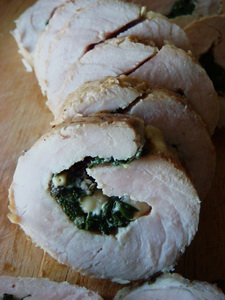My husband and I while travelling through Greece had this dish served to us in a restaurant in Rhodes with large baked potatoes. My husband has replicated this meal well in this recipe - although the luxurious Meredith Goats Feta has added a special touch which wasn't in the Greek version. You can substitute for any feta if Meredith Goats Feta is difficult to find - try to track it down however as it is in most health food and specialty stores. It does make it very special. The recipe can easily be made for two by halving the amounts. Be sure to watch the cooking time as pork is known to dry out - the stuffing does minimise this risk however which makes the effort in stuffing the pork even more worth your while. Recipe provided by Olly Steven.
 Pictured: Pork Stuffed with Spinach and Meredith Goats Feta
Pictured: Pork Stuffed with Spinach and Meredith Goats Feta
I – 2 fillets pork, or 1 loin of pork
Stuffing -
1 bunch spinach
Light olive oil
½ lemon
Salt and pepper
½ tsp nutmeg
½ cup pinenuts, toasted
Jar of Meredith Goats Feta Cheese
Preheat oven 180°C.
Prepare pork fillet for stuffing – butterfly the fillet by slicing it lengthways in half without cutting right through to the end – leave 1 cm attached. Lay the fillet on the table, butterflied side up, place a piece of cling film over and with a rolling pin or meat tenderiser, pound the fillet till it flattens to a thickness of 2cms.
Prepare the stuffing – sauté the spinach in some oil until it wilts, squeeze in lemon juice, add nutmeg and season well.
Stir in cheese and pinenuts.
Spread the stuffing over the pork, leaving a few cms at each end as it will spread out more when you roll it up.
Roll up the pork and with cooking string, tying the pork evenly at regular intervals so it holds its shape.
Heat a fry pan on med – high heat with some olive oil, and sear all sides of pork till nicely browned.
Lay pork in an oven tray and bake 10 minutes.
Let rest a few minutes before slicing to serve.
Serve with roasted potatoes
Serves 4
TasteTip - Stuffing is often used to moisten dry meats or soak up the juices from fatty meats. The Romans also enjoyed it as an element of surprise in the meal. In Kettner's Book of the Table in 1877 the French would roll cork-shaped stuffing, noted as 'de trop', which tended towards farce. Ironically, the word 'farce' derives from the French verb for stuffing.